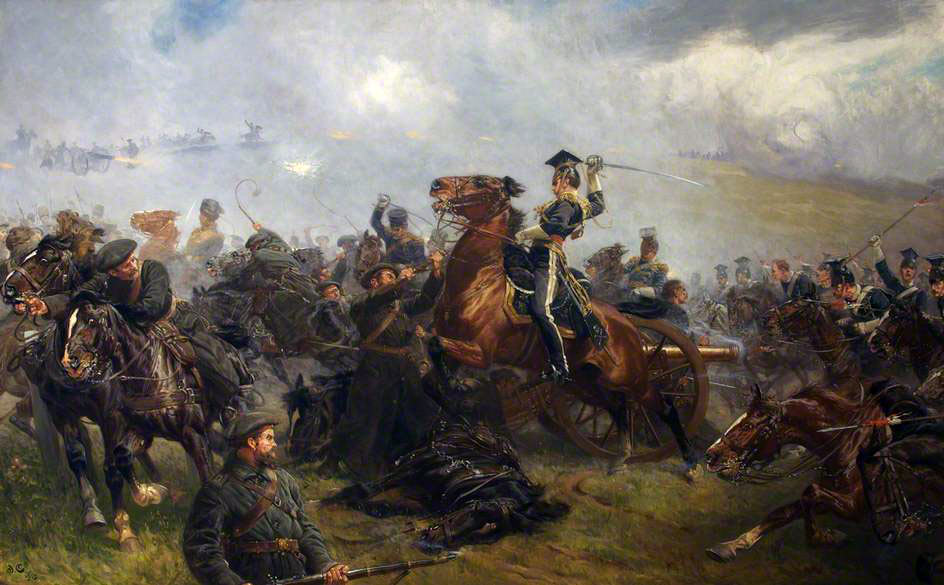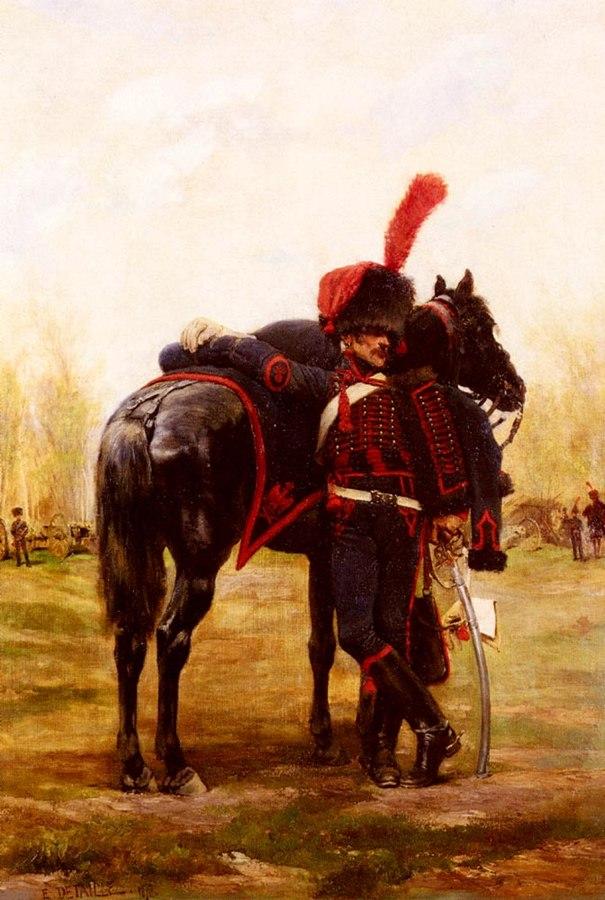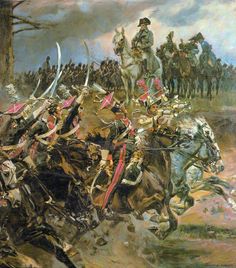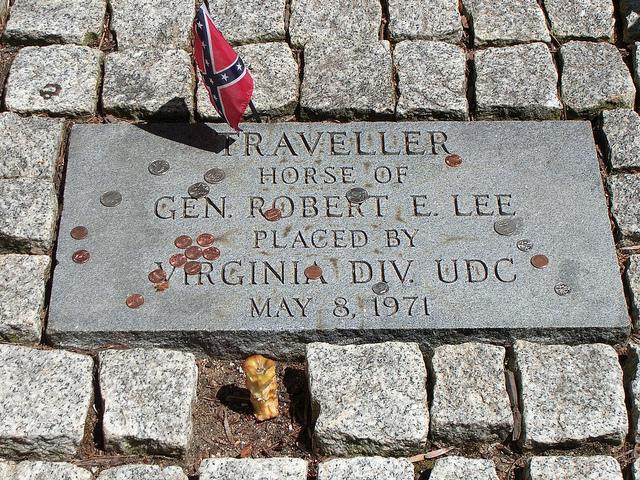They have fought, the bravest, for thousands of years; their record of defeat and victory is mixed but they’ve stood with the desperate, charged gloriously to victory, and – like all warriors – humped gear from one place to another.
Not just the glorious ones in front of the charge, they served by pulling the great cannon of the Napoleonic wars through waist-deep mud as thick as glue. There are a few who we name: Bucephalus, Veillantif, Traveller, Marengo, Lisette – most of them, are unsung.

The horse is named Sir Briggs; he is shown carrying some English guy.
Shakespeare’s Richard III, in one moment of clarity, understood that the horse can make the king. They’re always there, though, where the glory is happening. We sing about the riders, not the horses that also charged, obediently, straight into the guns. I first began to wonder about the horses when I read about the battle of Hattin, how the crusader knights marched out stupidly into the heat of Palestine, and were obliterated by Saladin’s forces when their horses couldn’t carry them and their armor. I was about 13 at the time, and finally, I thought, “it must have been horrible to be a horse.”

Cheval, avec Chasseur De La Garde, par Detaille
A great deal of military glory was won at great cost to the horses; they’re generally placid creatures, disinclined to charge into the face of artillery, or to march into the desert to be obliterated by storms of arrows. The horses I’ve known would prefer a nap in some sweet shady grass – it’s not the horses that come up with these desperate ideas, but they pay the price and they paid the price over and over and over for thousands of years. Their surprisingly delicate legs break easily, and they’re scared of being wounded. The great barrel chests that let them run or pull a cannon are big targets, easily pierced with arrow or artillery fragments; they don’t understand why they are suffering this, it’s not glory to them, it’s just what they’ve been asked to do. And they do it, because, I guess, horses have been bred not to ask – they’ve been bred to obey. Is that not the very essence of military glory, right there?
John Stuart Mill famously asked, “

The Polish Lancers at Somo Sierra “Take me that, at the gallop!” ordered Napoleon
A horse’s instincts are mostly gentle; they’re lazy creatures. The horse I used to occasionally ask to carry me around, P-nut, grumbled all the time and was reluctant to move faster than a big, beautiful trot, except for that one time the bear stood up right next to him in the corn field.
Horses don’t get ideas like humans give them, yet the alliance between the warrior and the horse allowed them both to be much more than, well, the horses ever bargained for. The polish lancers charged into grape-shot at Somo Sierra, and the few shattered survivors of the battle were almost all dismounted – a few lancers survived and virtually none of the horses did. But the lancers were considered to be brave to the point of foolhardiness for succeeding in such an attack against all odds. The horses succeeded too, except they don’t get credit for it. At the Charge of The Light Brigade, 118 humans of 600 died, but 540 horses of 600 galloped off and never came back. That’s how military glory works, I suppose.
In a recent post, I commented that perhaps a statue of Robert E. Lee could be torn down and replaced with just a statue of his horse, Traveller. [stderr] The American civil war killed about 600,000 men on both sides, and over 1 million horses. World War I killed 8 million horses. Robert E. Lee supposedly fought doggedly and did his best for a lost cause; what did Traveller do? Traveller carried Lee’s plutocratic ass through the entire war, and afterward, and outlived Lee by a few months – dying, tragically, of tetanus from a nail he stepped on. Knowing, once the infection set in, what would happen to the horse, some kind veterinarian blew his brains out with a pistol. The great horses who stood through so much, are so fragile; they’re not really very good for war, they’re just convenient. They were also convenient food, when an army marching on its stomach screwed up and was freezing to death marching back from Moscow in the winter: they ate the horses. Napoleon’s grand attack on Russia killed so many horses that the entire European population was depleted for a decade.
Then there was Comanche. Comanche was the sole survivor of Custer’s foolhardy, genocidal, attack at Greasy Grass, which resulted in the entire force being wiped out except for Comanche. From the histories I’ve read, it wasn’t hard to be smarter than Custer, but Comanche did better than all the humans on his side – I assume by running away, which is what horses are built to do. There aren’t many monuments to horses; I wish there were more. They have come to epitomize, for me, the pointless waste of the human quest for military glory.

Traveller’s rest
Traveller didn’t care about the confederate battle flag that some modern dipshit has placed on his grave. He probably cared, as horses do, for Lee; they went through a lot together. There must have been many times when Traveller was terrified of the things humans were doing, all around him, and he steadied himself and was still and brave because Lee, his human, asked him to be.
I’m glad we don’t ask as much of the horses as we used to. I doubt they miss the military glory.

I heard the Australian mounted divisions in the middle east were told to shoot their mounts at the end of the WWI because TPTB decided that shipping the surviving horses home to Australia would be too expensive, although some managed to sell/give them to the locals. There is a monument to the horses of the Light Infantry in Tamworth, here in Aust. and I’ve heard they’ve raised a monument in Israel to the Australian Light Horses as well. So there is some acknowledgement of their part in the Australian military.
Great post about a heart-breaking subject. At least, I always found it heart-breaking to hear how horses came out in these battles.
I read once how the cavalry trained their horses. They would start out the young remounts by having someone fire a very small and relatively quiet shot, then rush the horses over to the sound and feed them. Gradually they could fire bigger and louder guns from closer and closer, and the horses learned to rush **towards** the sound of gunfire because they expected to be fed. I always wondered if the trainers felt like traitors.
Also. Did you manage to stay on and enjoy that lovely ground-eating gallop that one time with the bear?
Horses vary greatly, from one individual to the next, but they all have to be specifically trained to deal with people, crowds, and noise, let alone war. People have always managed to treat their companion animals brutally when it comes to war. Horses, dogs, birds, whatever they might be. The dogs who saved so many lives in Vietnam? Look what happened to them. We don’t treat anyone nicely.
I believe “the question is not, Can they reason? nor, Can they talk? but, Can they suffer?” is a Jeremy Bentham quote, not a JS Mill one.
bttb@#4:
is a Jeremy Bentham quote, not a JS Mill one.
Yes, you’re right.
What’s frustrating is that I originally put Bentham, then changed it to Mill because I recalled (wrongly) that that particular formulation was Mill’s. I should have fact-checked myself.
kestrel@#2:
Did you manage to stay on and enjoy that lovely ground-eating gallop that one time with the bear?
We both came out of it OK. I suspect that Brother Bear was the must surprised of us all, “Why is this idiot trying to run me over with a horse? I’d better stand up so they can see I’m here!” Then picture a 16h percheron spinning on one hoof like a ballerina, me yelling “GO!” and then we were gone.
katkinkate@#1:
shipping the surviving horses home to Australia would be too expensive
There’s always been a lot of that. There are various populations of wild horses, like the ones on Assateague Island in Maryland, as a result of military mounts that were abandoned when the humans didn’t need them any more.
Caine@#3:
People have always managed to treat their companion animals brutally when it comes to war. Horses, dogs, birds, whatever they might be. The dogs who saved so many lives in Vietnam? Look what happened to them. We don’t treat anyone nicely.
Yeah, humans are real shits.
The British used to seem to be particularly stupid about getting into expeditions in strange places, then eating their dogs, “thank you for helping us get ourselves out here, but now we’re out of food … Good boy, etc.” The dog would have been quite content to sit on the porch woofing at butterflies, but noooooooo, some dumb Brit had to try to get to the South Pole or whatever.
@Marcus Ranum
#8
The British took Siberian ponies (well, maybe some dogs) to the South Pole (and ate them). It was the Norwegians who ate their own dogs.
@Marcus (#8):
You prompted me to do a little reading on the pony/dog question in the Antarctic:
From: https://en.wikipedia.org/wiki/Comparison_of_the_Amundsen_and_Scott_Expeditions#Ponies_vs_dogs
colinday@#9:
The British took Siberian ponies (well, maybe some dogs) to the South Pole (and ate them). It was the Norwegians who ate their own dogs.
I was specifically thinking of Shackleton’s expedition, which had a passle of dogs that they apparently thought were noble members of the expedition until they made soup out of them. I believe Mawson’s expedition (which was kind of a general purpose horrorshow) also turned into a dog-nosh. Mawson, to be fair, was not British, exactly – he was Australian.
I read Endurance and I felt bad for the dogs. The people were there because they chose to be.
I participated in one of the countermarches at Emancipation Park (formerly Lee Park) in Charlottesville. One of the speakers made the exact same point — when we finally take Lee down, Traveller can stay. As far as we know, he never hurt anybody, which is more than we can say about Lee.
I’ve lived on farms and seen what happens when one cow is slaughtered, usually by a shotgun to the head. The other cows start lowing incessantly for hours, pushing at fences, making noises I’ve never heard them make at any other time. Some question whether animals are capable of understanding death or can grieve, but if cows are any indication, horses probably react the same way to seeing their own shot.
As for eating your animals, Scott of the Antarctic ate their horses which were dying anyway, but refused to eat dogs as Amundsen did (and had planned to do). The return trip had lighter loads, thus Amundsen needed fewer dogs. This included forced cannibalism as a way to feed the surviving dogs.
http://www.bbc.co.uk/history/british/britain_wwone/south_approaches_01.shtml
There is a definite class-based aspect to the role of the horse in human warfare.
For the vast majority of our history – and I don’t think it has ever really disappeared – the horse was a status symbol and a luxury item. Especially the trained warhorse. In both Athens and Rome having the means to own and maintain a horse literally put you in a different social class to everyone who couldn’t – the hippeis in Solon’s system (considered to be anyone whose property could bring in 300-500 medimnoi of grain or equivalent each year) and the equites in the Roman one. In both cases the wealthy individual was expected to fight in the cavalry, rather than with the phalanx or the legions. Not to mention the vaunted social status of the knightly class in Medieval Europe. From the earliest days horses were a warrior-aristocrat’s interest – Hector from the Iliad famously gets the epithet “tamer of horses”, and the family of Nestor on the other side were renowned for their horses in the rich pastures around Pylos. The Athenian tyrant Peisistratus, who considered himself a descendant of old Nestor, gave his two sons (also tyrants) very horsey names (“Hippias” – Horseman and “Hipparchus” – Cavalry Commander) to show their aristocratic nature. Hengist and Horsa, the legendary Anglo-Saxon founders, likewise. And so it goes on.
In the Athenian, Roman and Medieval cases, the democratisation of warfare went hand in glove with social change and the diminution of the power of the horse-owning class. The dashing, dynamic chariot and cavalry warfare of the aristocrats of the Greek archaic age gave way to city states sending huge blocks of hoplites against one another. Cavalry became a sideshow at best – now you didn’t need to bring a horse to make a difference, all you needed was a spear and a shield. It is no accident that after the Battle of Marathon the Hoplite class in Athens became eligible to hold all the Archonships for the first time, which were previously held exclusively by the horse-riding Hippeis class and the super-rich in the class above. For naval cities like Athens it went even further – rowers in the fleet, the lowest property class, got full access to political office after the Battle of Salamis, when they were instrumental in protecting the city and projecting its power overseas. Now you didn’t even need a spear and shield to take part in meaningful warfare – all you needed was a rower’s cushion. It was only with the rise of Macedon and the dominance of fringe Greeks (practically still barbarians to the elite Athenians) who still venerated cavalry warfare like their Iliadic ancestors that cavalry and horse ownership became significant again. Throughout the Classical period they were mostly just used for scouting, message-running and occasionally harrying a fleeing enemy. Besides, the hated Persians were well into their horsemanship, so it must be deeply suspicious and aristocratic in nature. The barbarous nature of the Centaur in myth is highlighted a lot more in Greek art of this period, such as on the Parthenon friezes.
The Romans were similarly dependent on their infantry by the time they had come to European dominance, although seamanship was never as important to them as it was to the Greeks. They tended to outsource their cavalry needs to client auxilia, so being a horseman in reality lost the prestige and power it once had. Likewise with European knights once the peasants had figured out longbows and gunpowder. The slow decline of the Feudal system in Europe was greatly sped up when the traditional role of the knights – the business of war – was taken from them by technological and organisational change.
For the horses of the regular cavalry, of course, it meant that they lost much of the mystique and significance they once had, and were treated much worse than they had been when they were a valuable commodity. Early modern warfare began to collectivise and regiment the breeding and care of warhorses, where in previous ages each would have been attended to by the owner’s own grooms and stable staff, and taken better care of because replacements were much sparser on the ground. The fondness of commanders like Napoleon, Blucher and Lee for their horses is a romantic, aristocratic throwback out of keeping with the realities of warfare for their subordinates.
I don’t know if the same story applies in non-European histories. I would expect something quite similar with the Mongols and Imperial Chinese, and with the Samurai as their grip on military power waned.
Intransitive@#13:
Some question whether animals are capable of understanding death or can grieve, but if cows are any indication, horses probably react the same way to seeing their own shot.
Horses make long-term friendships. My ex-wife’s horse Joe, and my horse P-nut, were together for almost a decade before Joe strangulated an intestine and “went away in a trailer and never came back.” P-nut spent weeks running the fence-lines calling for him.
To slightly paraphrase Bentham, “the question is not whether they’re stupid, it’s how intelligent they are.”
I’m clearly an animal-lover (in case you hadn’t figured it out) and I generally feel that anyone who doesn’t think other animals are capable of complex inner lives hasn’t spent much time around them. I’ve been the butt of practical jokes from horses, and I’ve seen what can only be called “massive inter-species trust” (which is most of our relationship with dogs and horses) in many ways. When I finally put down one of my dogs because of spinal neuropathy, his brother sat next to him while I dug the hole for the body, then never ate again and I was digging another hole 2 weeks later.
I assume that the horses in a military unit come to know each other through shared hardship, just as the humans in the unit do.
cartomancer@#14:
the hippeis
“Those damn hippeis! They’re always causing trouble with their dope and tie-dye and horse!”
In Rome it was the equites, if I recall correctly. My track record on that stuff is bad. I don’t know to what degree the definition of a medieval knight evolved from Roman practices, but I suspect it’s what you’re teasing out: a mix of conspicuous consumption and military logistics. Cavalry are expensive. Until just after the Napoleonic Wars, cavalry was a stand-in for a standing army: since it took time to train and equip cavalry, they were a constant sunk cost, unlike militia. In more militarized societies (e.g.: feudal Japan) there was less of an inversion when a power brought up its military but in medieval Europe a lord was stripping his farms of workers to build up the militia; it was a huge gamble to do so once you militarized past your men-at-arms and mounted vassals. I remember one description of medieval battles as “the knights sort out who wins, and then slaughter the opposing side’s militia” well, until Agincourt and Crecy.
Samurai culture had its Agincourt and Crecy, at a place called Nagashino – when the Shingen clan’s highly reputed cavalry were blown flat by arquebusiers. As far as the Mongols, well, they became the imperial Chinese. The Taiping and Boxer rebellions probably screwed the economics of the empire up so badly that cavalry became less important. To your point: all of those map to waning of political power from the aristocracy to “commoners” though the Napoleonic Wars would be a special case since the Imperial French army was a national army made up of (in principle) commoners. They waned too, naturellement.
I’ve been getting a bit unglued because Doll, who is the alpha, will be 16 in October, and is notably slowing down, although she still has her moments when she goes psycho queen for Jayne, and plays with him by flipping him and chewing on his throat. Jayne is huge, and enthusiastic, but not overly bright, and needs Doll’s influence. While I don’t know how he’ll react to her loss, I do know he won’t do well as a single dog. And fuck me, I don’t want to even try for the “replacement”. I can’t replace my Coyote Queen, just thinking about not having her…oh, fuck. She’s wicked smart, never had to conventionally train her, just had to spend a couple of months reassuring her that she would be okay in the new place, with the new pack. She runs silent, relying on hand signals from me.
Normally, we have looked to bring in a new pack member when the oldest has turned 14 or so; but I haven’t had the slightest inclination to that this time. Fuck.
Caine@#17:
I’ve been getting a bit unglued because Doll, who is the alpha, will be 16 in October, and is notably slowing down
I got nothin’ except :(
Marcus, yeah, me too. Maybe she has a couple more years in her, so I best get off my ass and do things right. Doll would love a new person to train.
Caine: My sister’s gorgeous yellow lab started limping this month. They are waiting for the post-holiday oncology report. :(
I lost Max to bone cancer several years ago, so….
My sympathies.
bmiller@#20:
:(
Very interesting, cartomancer.
So Marx said that most aspects of culture were actually rooted in class and economics. But what you’re saying is that class and economics are actually rooted in changes of military strategy.
It seems to me, though, that social class, like religion, is something that evolves to fulfill a particular need in a society — but then develops a series of ancillary memes (“noble blood” in the case of aristocracy, for instance) to protect themselves, so that they often long outlive their original military necessity — particularly if (as in, say, much of the 18th century) current military tactics make it so that an non-optimized society is not regularly facing military annihilation.
I think that a lot of European history of the 17th, 18th, 19th, and 20th centuries was the story of the aristocracy seeking to hold onto power long after they had stopped being useful. In the middle ages, they really were important to defend their respective countries. But after gunpowder made them obsolete, they justified their power to run everything by trying to keep a monopoly on education. Then in the 19th century when education began to be more widely available, they doubled down even more on cultural superiority.
For me, “Downton Abbey” was mostly the story of Lord Grantham’s gradual, growing, realization that the only thing he had to meaningfully contribute to society was to act as a caretaker for a big hunk of architecture. He was all excited to go off and fight in WWI but they didn’t want him, his stock picks were disastrous, he wasn’t cut out for government, he fell back on “I provide employment for the community!” but then nobody wanted his crappy service jobs anymore.